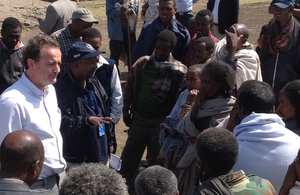Britain scales up its response to Ethiopia’s growing food crisis
New humanitarian support from Britain will help millions of people facing a severe and escalating food crisis in Ethiopia.

International Development Minister Nick Hurd at the site of a DFID-funded World Food Programme food distribution in northern Ethiopia. Photo: Bobby Stansfield/DFID
Ongoing drought has left 18 million Ethiopians in urgent need of relief. Crop failure and the death of livestock have led to widespread food shortages. Many children face the risk of malnutrition and a lack of clean water is increasing the threat of disease.
The UN and Government of Ethiopia have launched an appeal for an additional £923 million for the response.
The UK is already the second largest bilateral humanitarian donor in Ethiopia. A new £30 million package of support from the Department for International Development includes:
- £15 million to the UN’s World Food Programme so it can distribute emergency food to 1.9 million people
- £14 million for the Humanitarian Response Fund to help UN agencies and NGOs provide emergency water and healthcare and protect vulnerable girls and women
- £1 million to fund immediate secondments of humanitarian experts to the UN and Government of Ethiopia
International Development Minister Nick Hurd said:
A relentless drought is pushing millions to the brink in Ethiopia. The scale of the drought is similar to the one that killed so many in 1984. This time the Ethiopian Government is in a much stronger position to help their people. However, they need the help of the international community.
New funding from Britain will ensure families get the emergency food that they so desperately need in order to survive.
Working alongside the Government of Ethiopia, the UN and others, we are also helping to prevent child malnutrition, treat disease outbreaks and keep children in schools during this emergency.
But the scale of the current crisis means much more needs to be done. With millions in serious need of help, Ethiopia is facing a major humanitarian crisis and urgently needs the world to step up and provide lifesaving relief.
A stable, more prosperous Africa is firmly in Britain’s national interest and it is right that we do all that we can to prevent the crisis spiralling out of control.
The UK will also make an extra £25 million available to help those most in need, as part of our support for Ethiopia’s safety net programme which is boosting longer-term food security. This new support brings our total funding to the current humanitarian response in Ethiopia to £113 million.
While difficult to predict, the El Niño effect this year looks set to be the strongest on record, threatening people’s lives, health and livelihoods around the world. The Government of Ethiopia has committed to its largest ever response to a drought, but this is vulnerable to changing weather patterns. The scale of the crisis means a global response is needed.
Ethiopia has made great progress on development over the last decade. With UK support, the Government’s investments over the years have meant that Ethiopia can cope with the current crisis much better that would otherwise have been the case.
Britain’s long-term support for Ethiopia’s strategy to protect the most vulnerable has already helped millions of families to build their resilience to extreme weather events such as the current drought.
Notes to editors:
- Download free to use photos of the crisis
- Note on figures: the UN and government of Ethiopia estimate that due to the drought over 10 million are currently in need of food assistance and have launched an appeal for an additional $1.4 billion (£923 million) for the response. This is on top of 8 million extremely poor who are programmed receiving multi-year food security support under Ethiopia’s rural safety nets programme – bringing the total number of people in need of assistance to more than 18 million
Contact our Press Office: 020 7023 0600 (Overseas +44 20 7023 0600)